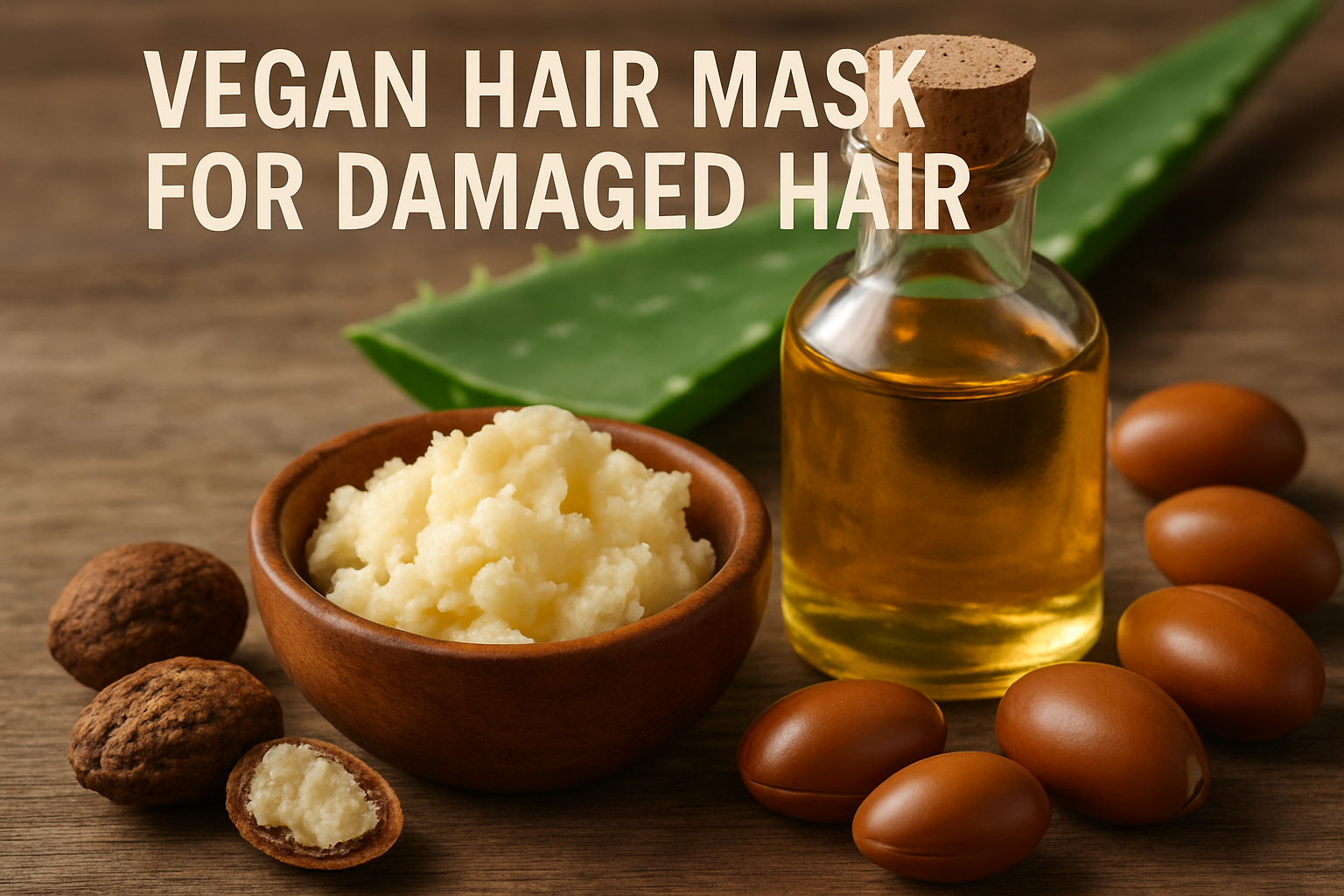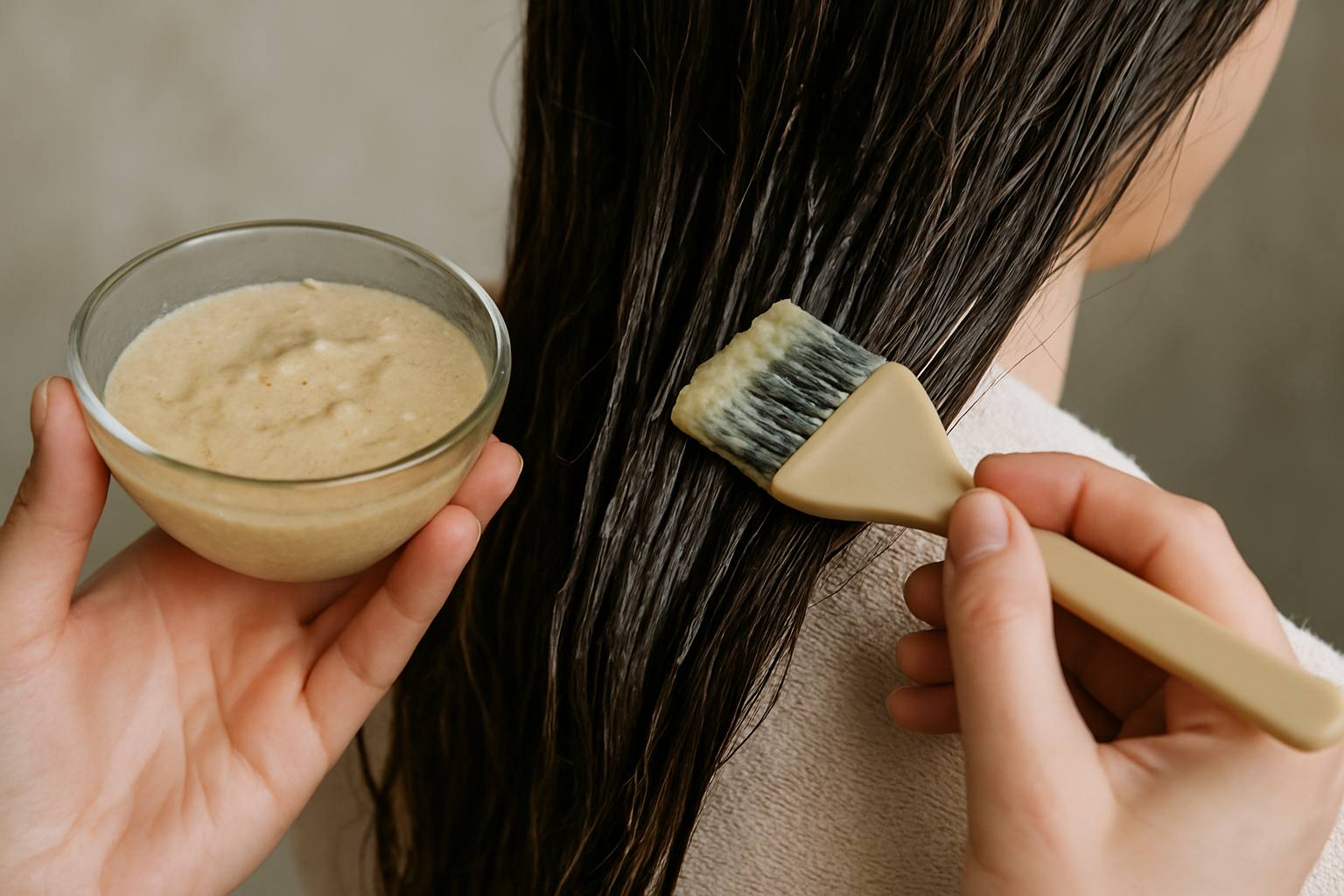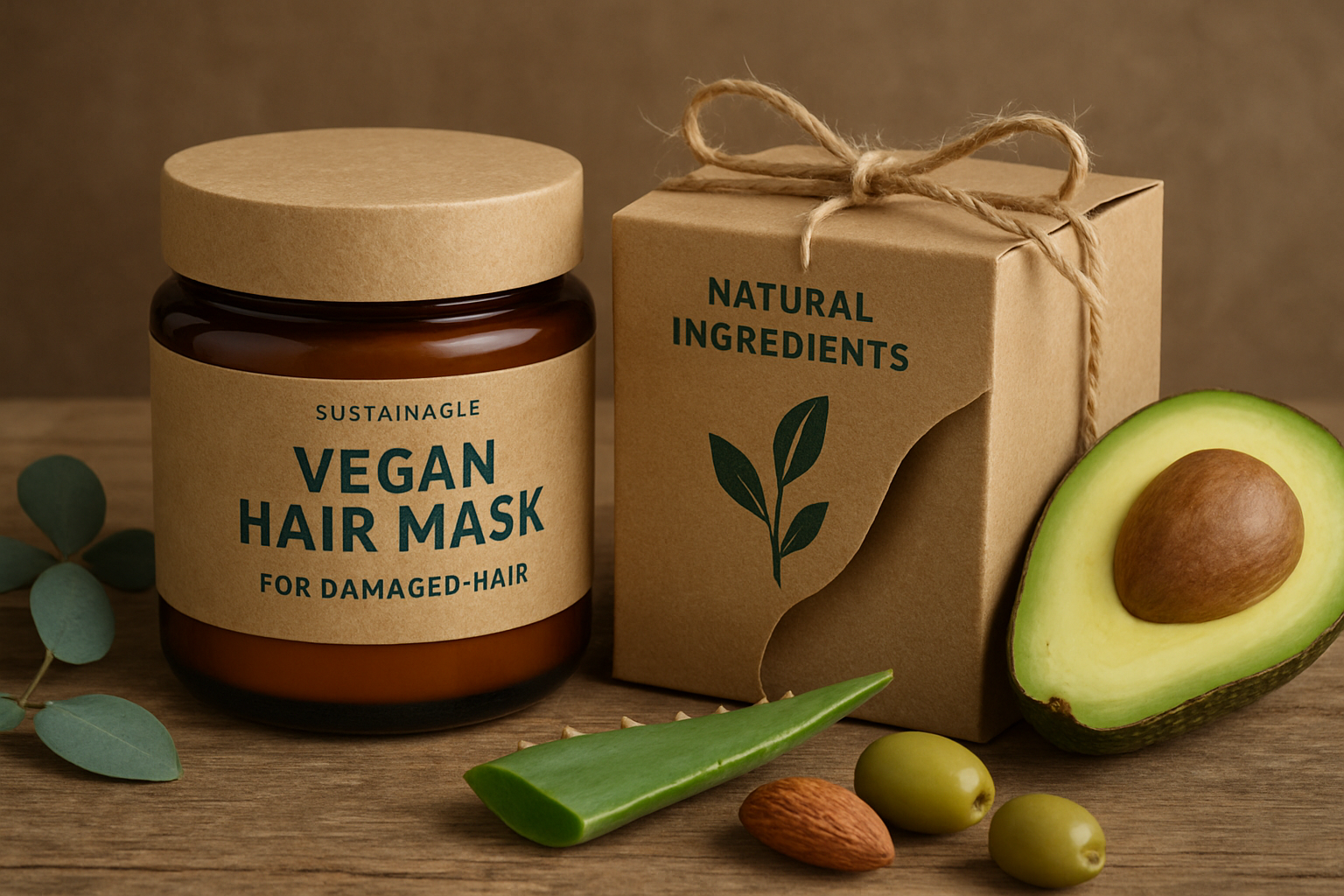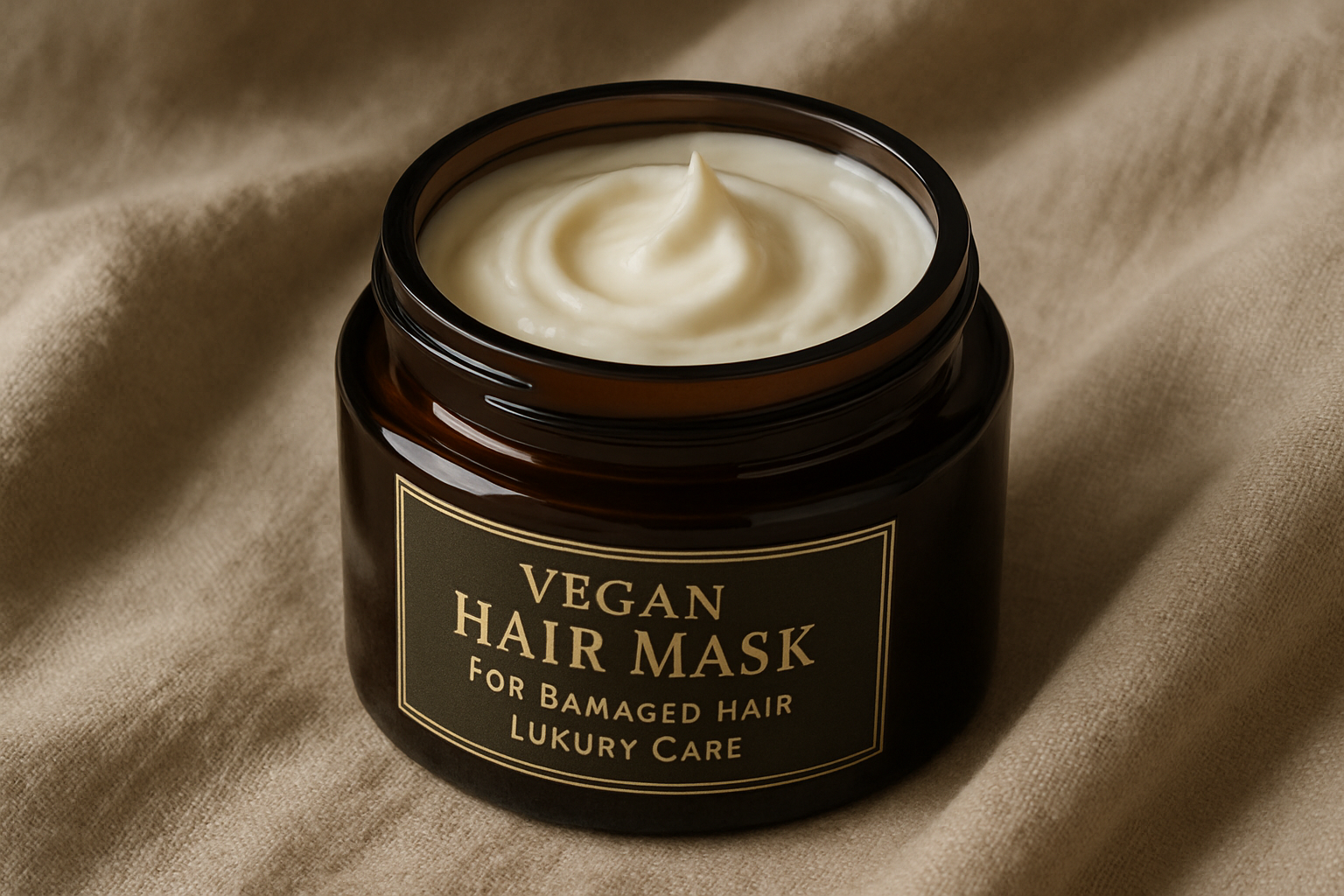
How to Choose and Use a Vegan Hair Mask for Damaged Hair with Lasting Results
Share
TL;DR: A vegan hair mask for damaged hair nourishes and repairs using plant-based, cruelty-free ingredients. This guide covers must-know benefits, recipes, and expert tips for lasting hair health.
Everyone knows that damaged hair needs more than just regular shampooing.
But what exactly can a vegan hair mask for damaged hair do for you?
Here’s a complete guide to understanding, choosing, and using the perfect vegan hair mask for damaged hair — plus, some recipes and product insights you’ll love.
Some are enriched with nutrient-rich oils that deeply hydrate and restore softness.
Some are lightweight yet powerful, suitable for daily conditioning without weighing hair down.
Some use ancient, traditional botanical ingredients turned modern solutions.
Some deliver molecular-level repair for even extreme damage caused by heat and chemical treatments.
Some respect your scalp’s sensitivity with fragrance-free, gentle formulas designed for sensitive skin.
Let's dive right in.
Why Use a Vegan Hair Mask for Damaged Hair?
Vegan hair masks offer a compassionate, effective way to nourish and repair damaged hair. Unlike traditional masks, vegan options avoid animal-derived ingredients and harsh chemicals such as silicones or parabens, relying instead on plant-based oils, butters, and proteins. These natural actives penetrate hair fibers, restoring moisture, elasticity, and strength over time.
Damage from heat styling, colour treatments, environmental stressors like sun and chlorinated water, or indoor heating can leave hair dry, brittle, and prone to breakage. A vegan hair mask targets these issues by delivering concentrated care that deeply hydrates and repairs from the inside out.
Importantly, vegan hair masks tend to be formulated with 90%+ organic botanical ingredients, offering a cleaner, gentler approach suitable for sensitive scalps and eco-conscious beauty routines. Their cruelty-free nature aligns with ethical values, while sustainable packaging reduces environmental impact.
Whether you have fine, thick, curly, or colour-treated hair, there is a vegan mask designed to support your particular needs, without the weight or feel of heavy silicones.
(Verified with sources Organic Beauty Lover and Kind2 as of 2025-08-31)
What Ingredients Make Vegan Hair Masks Effective?
Understanding the key ingredients helps you select a vegan hair mask that truly repairs damaged hair. Here are some star components to watch for:
- Plant Oils: Argan, coconut, olive, avocado, marula, and grapeseed oils provide essential fatty acids and antioxidants. They deeply moisturize hair fibers while sealing cuticles for smoothness and shine.
- Butters: Shea, babassu, cupuacu, and murumuru butters are rich in emollients that soften coarse or brittle hair without weighing it down.
- Hydrating Extracts: Aloe vera gel and oat milk soothe the scalp and provide gentle hydration, ideal for sensitive skin and flaky scalps.
- Proteins & Peptides: Hydrolyzed wheat protein, biomimetic peptides, and vegan keratin alternatives such as Karmatin work at a molecular level to repair broken bonds in hair, restoring strength and elasticity.
- Essential Oils & Botanical Extracts: Lavender, rosemary, tea tree, and mint oils add antimicrobial benefits plus a calming scent, without synthetic fragrances.
- Certified Organic & COSMOS-Approved: Choosing masks certified by COSMOS or certified organic ensures rigorous standards for ingredient purity and sustainable sourcing.
This ingredient harmony results in hair masks that hydrate deeply, improve manageability, rebuild resilience, and enhance natural shine gently and sustainably.

How to Choose the Right Vegan Hair Mask for Your Hair Type
Not all hair is the same. Your hair type, usual concerns, and lifestyle should guide your vegan hair mask choice. Here’s an easy way to match your needs:
- Fine or thin hair: Opt for lightweight, water-based masks with hydrating but non-greasy ingredients like aloe vera, oat extract, and hydrolyzed proteins. Avoid heavy butters which can weigh hair down.
- Dry or damaged hair: Look for rich, creamy masks with nourishing plant butters and oils like shea, marula, and coconut oil. Vegan keratin alternatives or peptide complexes boost repair.
- Thick, curly, or coarse hair: Intense hydration through thick, buttery masks with babassu or cupuacu butters helps tame frizz, soften strands, and define curls.
- Oily scalp with dry ends: Lightweight oil blends such as argan, grapeseed, and avocado paired with mint or rosemary essential oils balance scalp oiliness while nourishing ends.
- Colour-treated or heat-damaged hair: Masks containing biomimetic peptides, hydrolyzed wheat protein, and antioxidants protect colour and help repair heat damage.
Also, if you have sensitive skin or prefer fragrance-free products, choose masks without synthetic perfumes or known irritants. Many vegan hair masks cater specifically to this need.
Taking this personalised approach ensures your vegan hair mask restores your specific hair health without unintended side effects like build-up or irritation.
How Often Should You Use a Vegan Hair Mask for Damaged Hair?
Wondering whether to use a vegan hair mask weekly or every time you wash your hair?
Hair masks have a thicker, creamier texture than conditioners — think of them like a deep moisturizing treatment versus a light daily lotion. Generally, a hair mask is recommended once a week for normal to dry hair to repair and seal cuticles effectively. Overuse can cause build-up, even with natural ingredients.
If your hair is extremely dry, brittle, or chemically damaged, you can use a mask 2-3 times per week for intensive care. For fine or oily hair, using a mask less frequently or selecting a lighter mask is better to avoid weighing hair down.
Complement your weekly mask with a gentle, vegan conditioner after each wash to maintain hydration without heaviness. This layered approach nurtures hair without overburdening it.
Some leave-in vegan masks have become popular for their convenient, no-rinse formulas that provide daily nourishment while respecting hair balance.
Easy Homemade Vegan Hair Mask Recipes to Try at Home
If you prefer a low-waste, budget-conscious way to care for damaged hair, simple vegan hair masks can be crafted with everyday kitchen ingredients. Here are five recipes, inspired by thoughtful source content:
-
Coconut Oil Hair Mask (For Dry/Damaged Hair)
Warm 2 tablespoons of coconut oil until liquid. Apply from mid-length to ends, leave for 30 minutes, then wash out with a gentle shampoo. Provides softness and shine.
Note: Use sparingly; excess can clog drains in cold weather. -
Argan and Olive Oil Hair Mask
Mix 1 teaspoon argan oil, 2 teaspoons olive oil, and 3 drops rosemary essential oil. Apply, leave 20-30 minutes, then rinse.
Nutrients help restore moisture and soothe dry scalp.
Source -
Oat Milk Hair Mask (For Scalp Care)
Soak 50g porridge oats in 200ml water overnight. Strain through muslin cloth. Apply the milk to scalp for 10-15 minutes, then rinse.
Gently soothes flaky, sensitive scalp. -
Aloe and Argan Oil Hair Mask
Mix 1 tbsp aloe vera gel with 1 tsp argan oil and 1 drop tea tree oil. Apply for 20 minutes, then wash out. Hydrates and calms scalp. -
Argan and Avocado Oil Mask (For Oily Hair)
Blend 1 tsp argan oil, 1 tsp grapeseed oil, 1 tsp avocado oil, and 1-2 drops rosemary essential oil. Apply mainly to mid-lengths and ends.
Balances moisture without greasiness.
These small rituals connect you with natural ingredients while providing gentle yet powerful nourishment for damaged hair.

What Are Top-Rated Vegan Hair Masks on the Market?
For those seeking ready-made formulas that combine convenience and premium performance, several vegan hair masks stand out, elevating the care for damaged hair.
- Lolavie Intensive Repair Treatment: A silicone and water-free, 99% naturally derived mask ideal for thin to normal hair. Enriched with peptides and botanical extracts, it deeply hydrates without weighing hair down. Organic Beauty Lover
- Vegamour Hair Mask: This rich cream contains vegan keratin alternatives and botanical oils like marula and moringa to restore strength, manageability, and shine, suitable even for curly or coarse hair.
- Innersense Organic Hair Mask: A thick, buttery formula packed with shea butter, tamanu, and jojoba oils providing an intense moisturizing treatment for seriously damaged or thick curly hair.
- K18 Leave-In Molecular Repair Hair Mask: Unique for working on a molecular level with a patented peptide technology to reconnect broken bonds from heat, bleach, and chemical damage. It delivers visible strength, softness, and elasticity in just 4 minutes with no rinse needed. Clinically proven and vegan-certified, this mask is a game changer for extreme hair damage. K18 Hair
- Rahua Omega 9 Hair Mask: Infused with Amazonian oils and butters, offering a scent and experience rooted in tradition, blending effective nourishment with ethical sourcing.
- Everist Sustainable Deep Conditioning Concentrate: A waterless, customizable concentrate that can be diluted for different hair types. It’s packaged in recycled aluminium tubes emphasizing eco-friendliness and performance.
- Derma E Deep Conditioning Treatment: An affordable, lightweight lotion-style mask with rice amino acids and papaya extract, ideal for fine, fragile hair needing gentle care.
Choosing any of these ensures a careful blend of vegan, cruelty-free, and organic principles that respect your hair and values.
What Do Experts Say About Vegan Hair Masks?
Hair care professionals emphasise that vegan hair masks provide more than surface-level benefits. Unlike silicone-based masks that simply coat hair with a temporary shine, vegan masks often contain plant proteins, peptides, and oils that strengthen hair over time.
Dermatologists explain the key difference between hair conditioners and masks comparing them to moisturisers: conditioners act like gel moisturisers, lighter and suited for everyday use; masks are thick, cream moisturisers designed for deep repair usually applied weekly. For very damaged, frizzy hair, masks seal the cuticle to reduce breakage and improve manageability.
Industry experts also highlight that the shift toward vegan and cruelty-free hair care aligns with consumers’ growing demand for transparency, ingredient safety, and sustainability — without compromising on sensory experience or performance.
Using a carefully chosen vegan hair mask regularly can transform hair health, especially when paired with a consistent, gentle hair care routine.
How to Get the Best Results Using a Vegan Hair Mask for Damaged Hair
To unlock the full benefits of a vegan hair mask, follow these expert-backed steps:
- Start Clean: Use a gentle, sulfate-free shampoo to cleanse hair without stripping natural oils or irritating the scalp. This prepares hair cuticles to absorb mask nutrients fully.
- Apply Generously: After towel drying, apply the mask generously from mid-lengths to ends, where damage tends to concentrate. Avoid roots if you have oily scalp.
- Comb Through: Use a wide-tooth comb to distribute the mask evenly and detangle while applying. This ensures every strand benefits.
- Timing is Key: Leave the mask on for the recommended 10-30 minutes to allow deep penetration. Some intensive masks need longer; always follow product instructions.
- Rinse Thoroughly: Use cool or lukewarm water to rinse. Avoid hot water which can strip moisture. For leave-in masks, no rinse needed.
- Consistent Use: Incorporate masks weekly or biweekly, adjusting frequency based on hair condition.
- Protect Hair Daily: Minimise heat styling and use UV-protectant sprays or serums to preserve mask benefits.
- Pair With Complementary Products: Use vegan conditioners, serums, and hydrating sprays free of silicones and parabens to maintain healthy hair post-mask.
Following this routine ensures a nourishing self-care practice that respects both your hair and the environment.
Tip: Always perform a patch test before trying a new mask, especially if you have a sensitive scalp or allergies.
How Does a Vegan Hair Mask Support Sustainability?
Beyond hair health, vegan hair masks contribute to a more sustainable beauty routine in various ways:
- Plant-Based Ingredients: They rely on renewable botanical sources rather than animal products, reducing environmental footprint.
- Eco-Friendly Packaging: Many brands use recyclable or refillable packaging, aluminium tubes, and reduced plastics to minimize waste.
- Cruelty-Free Practices: The formulations are never tested on animals, aligning ethics with efficacy.
- Certifications: COSMOS and organic certifications ensure ingredients are sourced and processed responsibly, with minimal impact on ecosystems.
- Biodegradable Formulas: Natural ingredients break down safely, protecting water sources and aquatic life.
This mindful approach ensures your beauty routine is a celebration of both self-love and planet care — true luxury without compromise. Incorporating such products reduces your contribution to pollution, animal suffering, and chemical waste.
Explore more on sustainable skincare routines including organic facial care in this helpful guide: Unlock Radiant Hair Naturally: The True Power of Organic Hair Masks.

Frequently Asked Questions About Vegan Hair Masks for Damaged Hair
How is a vegan hair mask different from a regular hair mask?
A vegan hair mask contains no animal-derived ingredients and excludes harsh chemicals like silicones or parabens. Instead, it uses plant-based oils, butters, and proteins to naturally repair and moisturize hair. Regular masks may contain synthetic or animal-based components.
Can I use a vegan hair mask on colour-treated hair?
Yes, many vegan hair masks are safe and beneficial for colour-treated hair. Look for those that are colour-safe and free from sulfates and harsh chemicals to maintain vibrancy while repairing damage.
How long should I leave a vegan hair mask on?
Most vegan hair masks should be left on for 10 to 30 minutes, depending on the product and hair condition. Some intensive treatments or leave-in masks require shorter or no rinsing times. Always check product instructions.
Are homemade vegan hair masks effective for damaged hair?
Yes, simple vegan ingredients like coconut oil, argan oil, aloe vera, and oat milk can nourish hair effectively at home. However, commercial masks often contain specialized peptides and proteins that may offer deeper, longer-lasting repair.
What Is the Difference Between Conditioner and Hair Mask?
Understanding this difference is key for an effective hair care routine. Think of conditioner as a gel moisturizer — it’s thinner and designed to quickly smooth hair strands for daily use. A hair mask, however, acts like a cream moisturizer, offering thick, intense nourishment meant for weekly or occasional deeper treatment.
Using conditioner regularly maintains hydration and manageability, while a hair mask provides repair and restoration for damage. Overusing masks can weigh down hair or cause build-up, so balance is essential.
This explanation is beautifully illustrated by dermatologists in a clear video that breaks down these differences and usage tips for both products.
Watch this helpful video to understand when and how to use hair masks vs conditioners:
Final Thoughts on Vegan Hair Masks for Damaged Hair
Choosing and consistently using a vegan hair mask for damaged hair is a nurturing ritual that combines self-care, conscious living, and effective natural repair. With a wide variety of formulas—from lightweight hydrating gels to rich creams with plant-based keratin alternatives—there is an option to suit every hair type and concern.
By embracing clean, cruelty-free, organic ingredients, you protect both your hair’s health and the planet. The added benefits of sustainability and ethical production elevate your beauty routine into a meaningful practice of compassion and elegance.
Whether you choose to craft your own mask from pantry staples or invest in science-backed premium formulations like the K18 Molecular Repair Mask, your hair will thank you with renewed strength, softness, and shine.

What's Your Next Step?
Tell us in the comments: How will you apply this to your hair care routine? For personalised advice, contact us!
Embrace vegan beauty with informed choices and celebrate your hair’s natural vitality.
